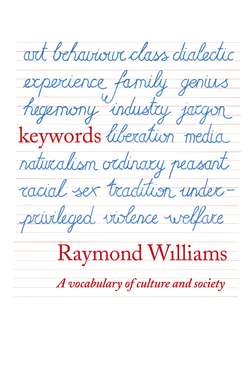Читать книгу Keywords: A Vocabulary of Culture and Society - Raymond Williams - Страница 32
COMMUNITY
ОглавлениеCommunity has been in the language since C14, from fw comuneté, oF, communitatem, L – community of relations or feelings, from rw communis, L – COMMON (q.v.). It became established in English in a range of senses: (i) the commons or common people, as distinguished from those of rank (C14–C17); (ii) a state or organized society, in its later uses relatively small (C14–); (iii) the people of a district (C18–); (iv) the quality of holding something in common, as in community of interests, community of goods (C16–); (v) a sense of common identity and characteristics (C16–). It will be seen that senses (i) to (iii) indicate actual social groups; senses (iv) and (v) a particular quality of relationship (as in communitas). From C17 there are signs of the distinction which became especially important from C19, in which community was felt to be more immediate than SOCIETY (q.v.), although it must be remembered that society itself had this more immediate sense until C18, and civil society (see CIVILIZATION) was, like society and community in these uses, originally an attempt to distinguish the body of direct relationships from the organized establishment of realm or state. From C19 the sense of immediacy or locality was strongly developed in the context of larger and more complex industrial societies. Community was the word normally chosen for experiments in an alternative kind of group-living. It is still so used and has been joined, in a more limited sense, by commune (the French commune – the smallest administrative division – and the German Gemeinde – a civil and ecclesiastical division – had interacted with each other and with community, and also passed into socialist thought (especially commune) and into sociology (especially Gemeinde) to express particular kinds of social relations). The contrast, increasingly expressed in C19, between the more direct, more total and therefore more significant relationships of community and the more formal, more abstract and more instrumental relationships of state, or of society in its modern sense, was influentially formalized by Tönnies (1887) as a contrast between Gemeinschaft and Gesellschaft, and these terms are now sometimes used, untranslated, in other languages. A comparable distinction is evident in mC20 uses of community. In some uses this has been given a polemical edge, as in community politics, which is distinct not only from national politics but from formal local politics and normally involves various kinds of direct action and direct local organization, ‘working directly with people’, as which it is distinct from ‘service to the community’, which has an older sense of voluntary work supplementary to official provision or paid service.
The complexity of community thus relates to the difficult interaction between the tendencies originally distinguished in the historical development: on the one hand the sense of direct common concern; on the other hand the materialization of various forms of common organization, which may or may not adequately express this. Community can be the warmly persuasive word to describe an existing set of relationships, or the warmly persuasive word to describe an alternative set of relationships. What is most important, perhaps, is that unlike all other terms of social organization (state, nation, society, etc.) it seems never to be used unfavourably, and never to be given any positive opposing or distinguishing term.
See CIVILIZATION, COMMON, COMMUNISM, NATIONALIST, SOCIETY
